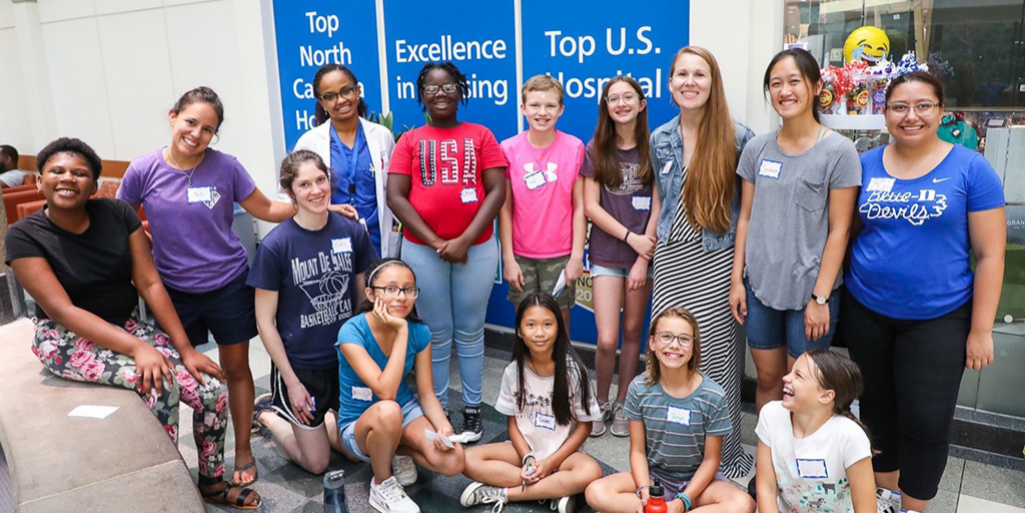Sydney Hunt

Being on a long-running Bass Connections team has allowed me to connect with amazing professors from multiple disciplines, learn how to pace my work throughout the year and gain confidence as a researcher in my own right while simultaneously having a positive impact on the Durham community.
Degree
Electrical & Computer Engineering and Computer Science ’23Project Team
During my time at Duke, my Engineering 101 professors, Dr. Sophia Santillan and Dr. Rebecca Simmons, have been crucial role models for me as a Black and Hispanic woman in STEM. From the start of my first year, I spent time during office hours and lunches having conversations with them about diversity and retention in STEM fields. So, when Dr. Santillan reached out and encouraged me to apply for her Bass Connections team, which investigates female math identity and the gender gap in STEM, I decided to give it a try even though I knew it would mean a course overload.
Women and people of color are underrepresented in STEM professions, and women of color even more so. Academia is no exception. According to a 2019 study by the National Science Foundation, only .43% of engineering faculty in the U.S. with the rank of professor were Black/African American women; the same number held true for Latina/Hispanic women.
Interestingly, math—specifically Calculus I—is the turning point for girls entering and exiting STEM. Girls’ persistence in math is a key predictor of a career in these fields. It was not until I read articles and saw the numbers on STEM retention through this Bass Connections project that I fully understood my own experience with math. Math was a subject I loved and thrived in up until college, when difficulties in calculus left me deeply discouraged about my future in engineering.
That is why I found our project—Improving Girls' Math Identity Through Problem-solving and Mentorship—to be so important. Each year, our team develops and runs a series of free workshops for middle school girls designed to help them investigate math concepts and problems through a hands-on curriculum. We work together to develop the workshop lessons and materials, serve as leaders of the workshops and then assess the impact of the program on girls' math mindset. When I started on the team in fall of 2020, due to COVID-19, we could not host workshops for girls in the Durham community as the team had done in previous years. Instead, we worked on analyzing data from previous years, reading the literature on girls’ math identity, and developing surveys for future workshop participants.

Finally, in spring of 2022, the team returned to leading workshops. As the team's Project Manager, I oversaw many workshop activities, but one of my favorites was a math race. Each room had a different, fun math problem, and students had to solve them in order to move on to the next room. I remember seeing the girls so eager and excited, running from one room to the next. When a student was unsure or nervous, her teammates would support her. It was beautiful to see them collaborating and cheering each other on.
In addition to creating a positive environment for girls learning math, this project has greatly impacted my academic and career trajectory. I am currently writing a thesis titled The Impact of Introductory Mathematics on Student Desire to Pursue a STEM Major. I am very grateful to have an advisory team of such powerful women in STEM: Shani Daily, Shira Viel and Karis Boyd-Sinkler, all of whom I was connected to by Sophia Santillan and Tori Akin, the co-leaders of the Bass Connections team.
Research can be intimidating, especially when you are first starting out. Emailing professors about their work can be a helpful start, but it is not something I initially would have felt comfortable doing! Being on a long-running Bass Connections team has allowed me to connect with amazing professors from multiple disciplines, learn how to pace my work throughout the year and gain confidence as a researcher in my own right while simultaneously having a positive impact on the Durham community.
Looking back, I remember how I worried about workload as I contemplated applying for this team. Yet, once the project began, the research did not feel like work at all because I enjoyed it so much. Without my Bass Connections experience, I might not have realized how passionate I am about research – so passionate, in fact, that I decided to apply for Ph.D. programs in engineering. I hope that along the way, I can inspire more women and girls to stay in STEM.
November 2022; excerpts from a conversation with Sarah Grace Engel, M.T.S., Program Coordinator, Bass Connections
